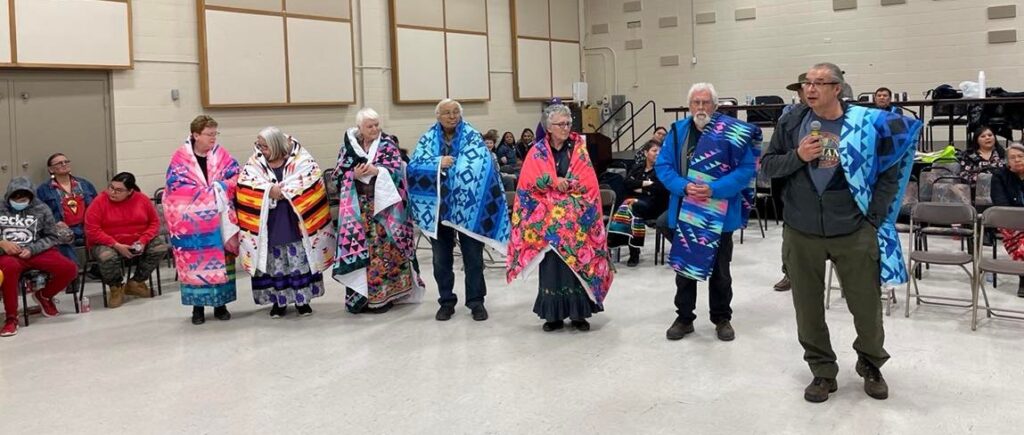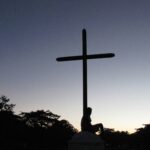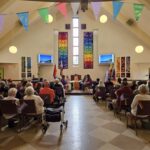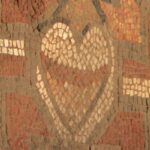We’re living in a difficult period of numbers decline for many parts of the United Church, even as we also explore new ways of being in ministry. Out of that decline and related property releases can come new relationships and new hope, including an opportunity to live into our commitments under the Truth and Reconciliation Commission’s Calls to Action.
In November of 2021, the Acimowin Opaspiw Society on Saddle Lake Cree Nation offered the United Church such an opportunity. They requested the transfer of Ashmont United Church, which was up for sale at the time, with the goal of it becoming a head office and cultural learning facility- a home for the language and cultural reclamation work in the community. Leah Redcrow, Director of Finance and Stakeholder Engagement, wrote, “I feel that the narrative of how the Church supported a Survivor organization with donation of one their properties, to be converted into a Cultural Learning Facility and Residential School Survivor Organization Headquarters, would be considered Reconciliation in action.”
The Property Commission, in consultation with Indigenous Ministries and Justice, agreed, and the Regional Council approved the transfer. In March of 2022, Northern Spirit Regional Council was invited to a round dance and ceremony to honour survivors, and to acknowledge the transition of Ashmont United Church from the house of a community of faith to the new home for a community of healing. Shannon McCarthy, Charlene Burns, Donna Kline, Ernie Kline, Cecile Fausak, and Bruce Jackson attended on behalf of the National Indigenous Council, and the United Church in Northern Spirit.
Cecile Fausak, who has supported right relations work for many years through Being Good Relations and the national church, noted the powerful speech offered by guest Judge Ladouceur, and her respect for deep “Cree generosity, and the presentation of a beautiful blanket to people they have never met before. …Judge Ladouceur made a powerful speech, in tears as he spoke of the heart-breaking job of having to send his people to jail, and the need to establish an Indigenous justice system.”
Charlene Burns, Maskwacis First Nation and Community Capacity Development Coordinator for Indigenous communities of faith and ministries in the West, has often said that “Breaking bannock together is how we get to know each other.”

From left to right: Shannon McCarthy, Charlene Burns, Donna Kline, Ernie Kline, Cecile Fausak, Bruce Jackson, and Judge Ladouceur.
(Please see a photo gallery here.) Gathering for a round dance, being fed in community through the singing and the drum, and receiving the honour of presented gifts: all these are a gift to those who attended, the former community of faith at Ashmont, and to the Regional Council as a whole. At a time when Regional Council members have been unable to visit with United Church members on Goodfish Lake and Saddle Lake Cree Nations, to offer a future home for a healing and cultural space is one small offering of support to a community where the United Church has both deep roots and a need to offer reparations for the residential school system.
Background
The background and wider context of the obstacles that face language and culture reclamation are an important part of this story. For many years, the Being Good Relations Network has urged the people of the United Church to understand the enduring colonial, systemic barriers to truth telling and true reconciliation. The Indian Residential Schools system lives in on in a myriad of inequities and regressive policies; this is, for example, one reason for our Regional Council’s action on the proposed Alberta curriculum, and its associated negative impacts on our society’s shared TRC commitments.
Explaining the request for the building, Leah Redcrow wrote, “The Acimowin Opaspiw Society is a non-profit Corporation, and was formed to represent the interests of local Residential School Survivors in Treaty 6 east. The majority of our members and survivors attended the Blue Quills Residential Schools, run by the Catholic Church. However, many of our community members were sent to the Red Deer Industrial School and the Edmonton Residential School, run by the United Church. As the church is aware, these institutions enforced assimilation, genocide and cultural genocide on our people, and directly contributed to the destruction of our communities, with inflicting abuse, trauma, intergenerational trauma, loss of language, culture and identity as First Nations People.
The issue that I have identified through, research, and the feasibility study is that the children who attend the off reserve Provincial Schools do not receive equitable cultural supports or funding as their on reserve cohorts, who are enrolled in on reserve schools. The reason being that the children who attend Provincial Schools are not viewed by the Province of Alberta as being eligible for support funding; that they would receive, if they lived off reserve.
Thus, the Government of Canada does not provide extra funding for these children either. The Government of Canada only pays tuition to all Provincial Schools, for students who reside on reserve. The Government of Canada only provides extra funding for students who attend on reserve schools, because the on-reserve schools are under the Government of Canadas jurisdiction. Due to this residency discrepancy, there is a gap in cultural supports and services for these students; which even Jordan’s Principle does not cover. Jordan’s Principle cannot initiate a health funding arrangement with a School Authority. What makes this situation more critical, is, the Government of Alberta, three years ago, cut all Cultural Education funding for First Nations, Inuit and Metis initiatives.
The partnership that’s being formed between the St Paul School District and the Acimowin Opaspiw Society, is, for our organization to provide land based learning and cultural life skills to the students, without costs on the SPSD, and the SPSD will arrange for the students to attend the facility to gain knowledge of their culture, language and cultural life skills that were nearly reduced to extinction, by the Indian Residential School System.
The Survivors and members of our Society see this lack of cultural supports as a step back in the reconciliation process. This is due to the fact that the children are not immersed in their language, culture, indigenous identity, nor are they provided the cultural knowledge, skills and language that has been passed down generation to generation since time immemorial. Our Society has the capacity to provide these cultural learning skills, and language reclamation resources to the children. Our Society has in place the appropriate individuals who can and have agreed to pass down the following teachings to the children.”
May our Creator bless and guide the healing path and work of the Acimowin Opaspiw Society, and all who join them on the land or come through the doors.





